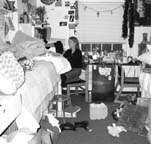
Students survive dorm-ant college phase
By this time of year, nearly every student on campus has had the privilege of gaining the residence hall experience. For some it has been good, and for others, not so good.
But convenience, cost and community are factors that just might bring students back for another year.
The residence halls can offer a good transition from living at home to living on your own. It can also allow students to meet new people and interact with people different from them.
“Most people who live in the dorms are freshmen, and they are used to living with their family. The dorms help them get used to a diverse group of people,” said Christina Saiw-Lattey, a junior chemistry major and Resident Assistant in Morrison-McGinnis Hall. “Once you leave college, you’re not going home. You’re going into the real world, and you will have to know how to deal with all kinds of people.”
Some students find residence hall life a good place to meet, mingle and develop lasting friendships.
“The best aspect of living in the dorms is that you get to build a community with other people you don’t know,” said Aureyelle Stewart, a sophomore art history major and Resident Assistant in Boaz Hall. “It gives you an opportunity to meet people you wouldn’t have met if you lived at home or in an apartment. It is an opportunity to build friendships.”
Residence halls also help students branch out and get more involved in school activities. Sitting in the lounge, doing laundry or getting ready in a community bathroom can be a great way to find out what activities the other students on the floor are attending.
“You’ve got different people with different activities and different ways of thinking that can open up your own mind,” said Jerrika Hinton, junior theater major and a Resident Assistant in Shuttles Hall.
On a campus where parking is a significant problem and sleep is always a priority students enjoy the convenience of living in resident halls.
“I liked living in the dorms better than an off-campus apartment,” said junior psychology major Michelle Pakula.” You didn’t have to drive anywhere. Finding parking was the worst part of living off-campus.”
For some, living on a college budget can also be a burden. Residence hall living can be a cost-effective way to live when room and board are included in the package.
The least expensive residence halls on campus are Boaz Hall, Mary Hay Hall, Peyton Hall and Shuttles Hall, which cost $3,855 per academic year for a double occupancy room.
Living in the residence halls has many positives, but the most common complaint is the small size of the rooms.
Some suggestions in dealing with the tight squeeze of residence life are building up, rather than out.
“It’s best to use vertical space. Don’t put more stuff in your room horizontally,” Saiw-Lattey said. “For example, if you get an extra desk, put a pantry and refrigerator on top of it. It’s all about vertical space.”
If you need help making space effective, the Container Store has rooms set up every fall and specialists to help.
“You don’t have enough space no matter what, so you have to be creative,” said Cindy Bourne, room specialist at the Container Store.
Stewart and Hinton feel organization is not as important as giving a room a personal touch.
Said Stewart: “Some rooms have a feeling of home because of decorations, curtains, paintings, color schemes or picture of friends.”

Students survive dorm-ant college phase








